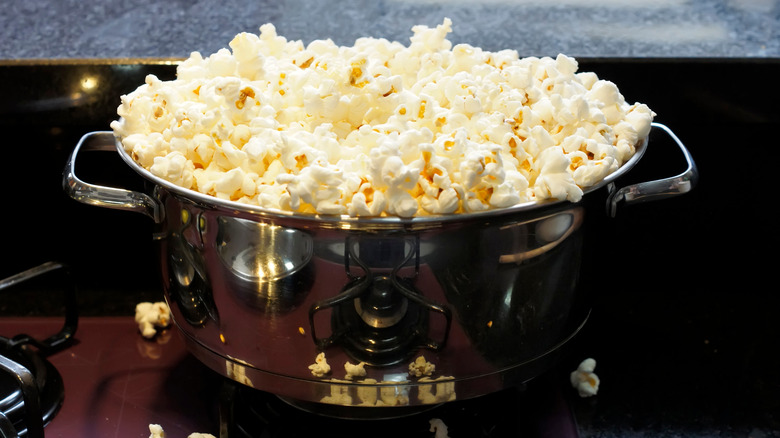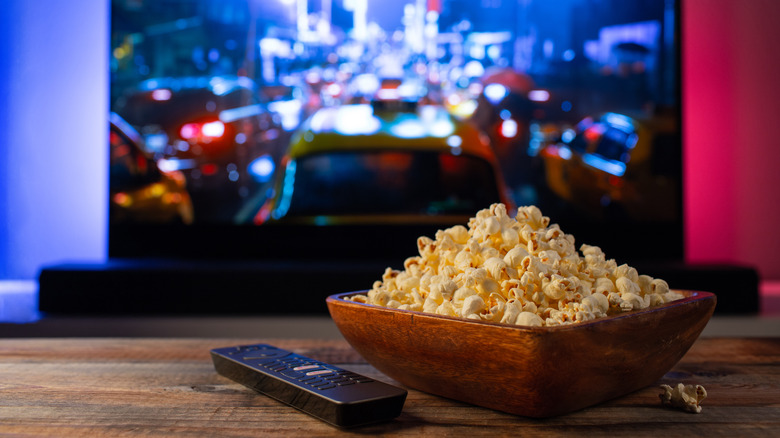Alton Brown's Metal Bowl Trick Prevents Popcorn From Burning
In a race for the most supreme snack, few munchies can top a bowl of fresh popcorn. The biggest problem with popping corn kernels on a stove at home, however, is the likelihood of them burning. One reason popcorn is so popular is because of its airy and dainty texture, but this is also what makes it so susceptible to burning. More often than not, the culprit behind the buttery gold corn kernels burning is the cooking vessel. Using anything but a heavy-bottomed pot, for example, will likely result in burnt popcorn because lightweight vessels can't circulate heat as evenly.
Television personality and chef Alton Brown has another vessel tip for perfect stovetop popcorn: use an 18/10 heavy gauge stainless steel bowl that is somewhere in the 6-quart range. In a video posted on Food Network's Youtube channel, he explains that the shape of the bowl prevents the popcorn from burning.
Make stovetop popcorn the Alton Brown way
To execute Brown's stovetop trick, you'll need three things: the aforementioned bowl, a pair of tongs to shake the popcorn, and a sheet of aluminum foil to cover the bowl. Once you have these things, Brown recommends adding 3 tablespoons of neutral oil for half a cup of popcorn kernels to the bowl, with some salt to finish it all off. Before firing up the stove, Brown wraps the bowl with a tight sheet of foil and proceeds to punch a few holes in it to allow for excess steam to escape.
The popcorn will not burn in the bowl because the popped kernels are able to escape the bottom, where all the oil and unpopped kernels pool and where the heat — and hence the chances of burning — are the highest.
Although Brown recommends using a heavy gauge bowl in the 6-quart range, the exact size of the bowl will depend on your popcorn needs. As long as it's a thick, heavy gauge bowl, even a 3-quart bowl or an 8-quart one will do the trick.
More Alton Brown tips for the perfect popcorn
Using a stainless steel bowl isn't the only trick Brown has for fluffier popcorn. Whether you prefer your popcorn very lightly seasoned or doused in flavorings, no popcorn is complete without a dusting of salt. Rather than sprinkling with just any salt, however, Brown's video recommends using popcorn or pickling salt. These types of salt tend to have a much finer texture that will get into all the crevices of a popped kernel much better. In case you don't have such salt, you can easily make your own popcorn or pickling salt by simply pulverizing some kosher salt in a food processor for a couple of seconds. Additionally, Brown recommends adding the salt before the kernels are popped for the optimum salt-to-popcorn ratio.
Brown also has a tip or two about the fat used to make popcorn. Although butter has a reputation for making everything taste better, including popcorn, he doesn't recommend using it as the fat to pop the kernels in due to its tendency to burn under high heat. Instead, he suggests leaving the popping to a neutral oil with a high smoke point, like peanut oil, and drizzling the corn kernels with melted butter only after they have already popped. Once you have your freshly popped, fluffy, and unburnt bowl of popcorn, consider seasoning it with nutritional yeast, cheese powder, thyme, rosemary, or Japanese furikake for popcorn, the Alton Brown way.



